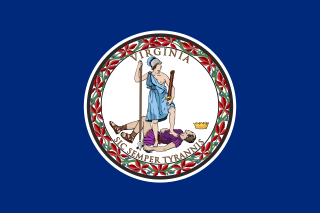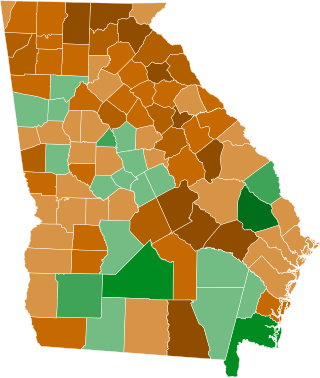
The governor of Michigan is the head of government, and chief executive of the U.S. state of Michigan. The current governor is Gretchen Whitmer, a member of the Democratic Party, who was inaugurated on January 1, 2019, as the state's 49th governor. She was re-elected to serve a second term in 2022. The governor is elected to a four-year term and is limited to two terms.

The governor of the Commonwealth of Virginia serves as the head of government of Virginia for a four-year term. The incumbent, Glenn Youngkin, was sworn in on January 15, 2022.

Thomas Chipman McRae was an American attorney and politician from Arkansas. He served as a Democratic member of the United States House of Representatives and the 26th Governor of Arkansas, from 1921 to 1925.

John McDougal was an American politician who served as the second Governor of California from January 9, 1851, until January 8, 1852. Prior to this, he served from 1849 to 1851 as the first Lieutenant Governor of California.

The 1994 California gubernatorial election was held on November 8, 1994, in the midst of that year's "Republican Revolution". Incumbent Republican Pete Wilson easily won re-election over his main challenger, Democratic State Treasurer Kathleen Brown, the daughter of Pat Brown and younger sister of Jerry Brown, both of whom had previously served as governor. Although Wilson initially trailed Brown in the polls as a result of the state's faltering economy, his signature opposition to affirmative action and state services for illegal immigrants eventually led to his win. Wilson won 25% of the African American vote, a fairly strong performance for a Republican. However, he won only 25% of the Latino vote, a weak performance which was widely attributed to his support of Prop 187. This election was the first California gubernatorial election since 1974 in which the winner of the gubernatorial election was of a different party from the incumbent president.

The 1966 California gubernatorial election was held on November 8, 1966. The election was a contest primarily between incumbent governor Pat Brown and former actor Ronald Reagan, who mobilized conservative voters and defeated Brown in a landslide. As of the 2022 gubernatorial election, this is the last time an incumbent governor of California lost re-election, though one subsequent incumbent governor was recalled.

United States gubernatorial elections were held on November 5, 2002, in 36 states and two territories. The Republicans won eight seats previously held by the Democrats, as well as the seat previously held by Minnesota governor Jesse Ventura, who was elected on the Reform Party ticket but had since renounced his party affiliation. The Democrats won 10 seats previously held by the Republicans, as well as the seat previously held by Maine governor Angus King, an independent. The elections were held concurrently with the other United States elections of 2002.

The 1962 California gubernatorial election was held on November 6, 1962. The Democratic incumbent, Pat Brown, ran for re-election against former U.S. vice president and 1960 Republican presidential nominee Richard Nixon. In his concession speech the following morning, Nixon accused the media of favoring his opponent Brown, stating that it was his "last press conference" and "You won't have Nixon to kick around any more." Six years later, Nixon was elected President of the United States, and exactly ten years after this press conference he was re-elected in a landslide.

The 2003 United States elections, most of which were held on Tuesday, November 4, were off-year elections in which no members of the Congress were standing for election. However, there were three gubernatorial races, state legislative elections in four states, numerous citizen initiatives, mayoral races in several major cities, and a variety of local offices on the ballot.

The 1934 California gubernatorial election was held on November 6, 1934. Held in the midst of the Great Depression, the 1934 election was amongst the most controversial in the state's political history, pitting conservative Republican Frank Merriam against former Socialist Party member turned Democrat Upton Sinclair, author of The Jungle. A strong third party challenge came from Progressive Raymond L. Haight, a Los Angeles lawyer campaigning for the political center. Much of the campaign's emphasis was directed at Sinclair's EPIC movement, proposing interventionist reforms to cure the state's ailing economy. Merriam, who had recently assumed the governorship following the death of James Rolph, characterized Sinclair's proposal as a step towards communism.

The 2014 California gubernatorial election was held on November 4, 2014, to elect the Governor of California, concurrently with elections for the rest of California's executive branch, as well as elections to the United States Senate in other states and elections to the United States House of Representatives and various state and local elections.

The 1859 California gubernatorial election was held on September 7, 1859 to elect the governor of California.

United States gubernatorial elections were held on November 2, 2021, in two states, New Jersey and Virginia, and a recall election was held in California on September 14. These elections form part of the 2021 United States elections. The last gubernatorial elections for New Jersey and Virginia were in 2017, and the last regular gubernatorial election for California was in 2018. Going into the elections, all three seats were held by Democrats.

The 1857 Wisconsin gubernatorial election was held on November 3, 1857. Republican Party candidate Alexander Randall narrowly prevailed, defeating Democratic candidate James B. Cross by a margin of just 454 votes.

The 1990 California lieutenant gubernatorial election was held on November 6, 1990. Incumbent Democrat Leo T. McCarthy defeated Republican nominee Marian Bergeson with 51.29% of the vote.

The 1851 Connecticut gubernatorial election was held on April 7, 1851. It was a rematch of the 1850 Connecticut gubernatorial election. Incumbent governor and Democratic Party nominee Thomas H. Seymour defeated former state legislator and Whig nominee Lafayette S. Foster with 48.94% of the vote.
The 1851–52 Massachusetts gubernatorial election consisted of an initial popular vote held on November 10, 1851, followed by a legislative vote conducted on January 12, 1852. Incumbent Democrat Governor George S. Boutwell was reelected to a second term in office. The ultimate task of electing the governor had been placed before the Massachusetts General Court because no candidate received the majority of the vote required for a candidate to be elected through the popular election.

The 1886 Wisconsin gubernatorial election was held on November 2, 1886.

The 1851 Georgia gubernatorial election was held on October 6, 1851, to elect the governor of Georgia. Howell Cobb, nominee for the newly formed Constitutional Union Party, defeated the Southern Rights Candidate, Charles McDonald.

The 1853 Ohio gubernatorial election was held on October 11, 1853.




















